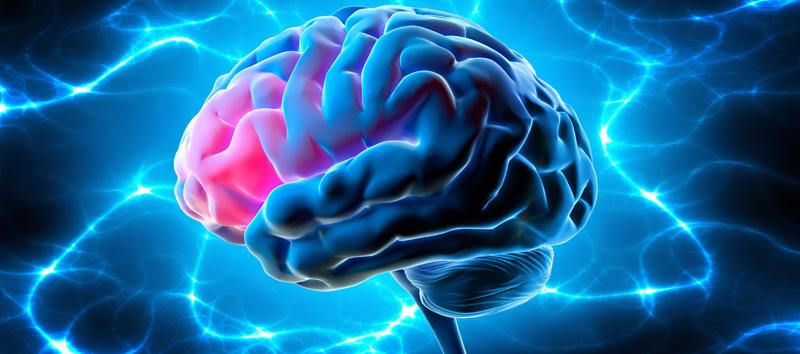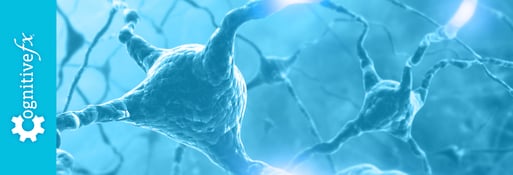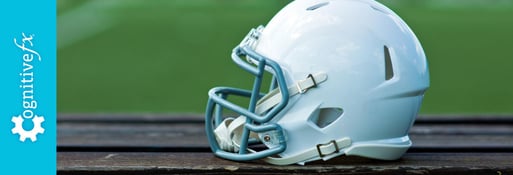Know Your Concussion Myths and Facts
We know that there are millions of individuals who suffer from concussions yearly. There is no better time than now to expand our knowledge and application of research to help individuals recognize...
Published peer-reviewed research shows that Cognitive FX treatment leads to meaningful symptom reduction in post-concussion symptoms for 77% of study participants. Cognitive FX is the only PCS clinic with third-party validated treatment outcomes.
READ FULL STUDY
Attention deficit hyperactivity disorder (ADHD) is difficult enough to handle alone. When you add concussions into the mix, it can feel overwhelming. The relationship between ADHD, concussions, and post-concussion syndrome is still being researched, but that doesn’t mean there’s no good info or treatment options for patients who need them.
Before we dive into the details, we wanted to acknowledge that a mention of ADHD can elicit confusion, discomfort, frustration, or all of the above. People range from not understanding the disorder or not caring about it, to having strong opinions that they feel the need to tell every friend and family member. If you’ve been diagnosed with ADHD, all the tumult can easily lead to you not wanting to talk about it.
We want this to be a neutral, safe resource for you and your loved ones, so we don’t intend to wade into the debate over ADHD diagnosis and who ought to be on medication for it. But we will help you learn about:
Whether you or someone you love is affected, we hope sharing what we know about the interplay between ADHD and concussions helps you make informed decisions about your future.
If you’re experiencing difficulty concentrating, trouble with conversation tracking, or other symptoms that won’t go away after a concussion, we can help. On average, our patients improve by 75% after treatment. To learn about diagnosis and treatment options, schedule a consultation.
Note: Any data relating to brain function mentioned in this post is from our first generation fNCI scans. Gen 1 scans compared activation in various regions of the brain with a control database of healthy brains. Our clinic is now rolling out second-generation fNCI which looks both at the activation of individual brain regions and at the connections between brain regions. Results are interpreted and reported differently for Gen 2 than for Gen 1; reports will not look the same if you come into the clinic for treatment.
ADHD is listed by the Centers for Disease Control and Prevention (CDC) as a neurodevelopmental disorder of childhood (but which can still affect adults). It is characterized by poor impulse control, inattention, difficulty maintaining attention, and high energy levels (at least when it comes to the need to fidget!). Children with ADHD have an increased risk for mental health issues after they’ve grown to adulthood.
People often ask about attention deficit disorder (ADD), or ADHD without hyperactivity. This is no longer treated as a separate condition and would still be considered ADHD. The change in naming conventions does not mean that all ADHD patients are hyperactive.
Genetic causes are suspected, but we don’t really know what causes ADHD. And because of that, there is no single test that can definitively determine if you have ADHD. Diagnosis of ADHD is based on the observations of parents and teachers.
Most people are diagnosed as children, but some are diagnosed in adulthood. Misdiagnosis, especially in adulthood, is a very real possibility because there are other conditions, such as post-concussion syndrome, that have overlapping symptoms. We’ll talk more about understanding the difference between traditional ADHD and ADHD-like symptoms from a concussion later in the post.
There is still so much we don’t know about ADHD and concussions. But research has shown a few connections.
First, studies have shown that ADHD can increase your risk of concussions. When you think about it, it makes sense: Impulsivity means children and adults with ADHD are more likely to make decisions that put them in danger of concussion.
But there’s another possible risk factor. If ADHD involves any problems with visual or auditory processing (as some researchers suspect), that could also contribute to concussion risk.
Many children diagnosed with ADHD are encouraged to take up sports to help with the hyperactivity aspect of their difficulties. If their depth perception, visual-motor speed, auditory processing, or any other related function is lacking, they’re more likely to collide with teammates, take a ball to the head, slam into the goalposts ... You get the idea. The risk of a sport-related concussion in these cases is high.

We also know that student athletes who undergo testing for concussions have lower baseline scores in vestibular (the system involved in balance), ocular, and neurocognitive assessments if they had preexisting ADHD or another childhood learning disorder. And if they do sustain a concussion, they’re more likely to suffer from increased severity in certain symptoms (such as difficulty concentrating, difficulty remembering, and balance problems).
On the other hand, up to 30% of concussion patients develop long-lasting symptoms, some of which overlap with ADHD symptoms. Having lingering symptoms after a concussion is known as post-concussion syndrome.
So, while symptoms may overlap, and the two conditions can present as comorbid (meaning you can have both at the same time), ADHD and post-concussion syndrome are not the same thing. And it can be difficult to determine which you have.
Post-concussion syndrome can be detected using a type of functional MRI called fNCI. Early research indicates that ADHD may present abnormalities upon examination with fMRI, depending on the type of fMRI testing conducted, but this information is not yet clinically usable.
Because of how little we know about the cause of ADHD, it’s even more difficult to pin down how concussions affect patients with ADHD. We do know that concussions can cause ADHD-like symptoms in patients without neurodevelopmental disorders and that they can make existing ADHD symptoms worse. But since the cause of the symptoms from each is not the same, treating one will not necessarily treat the other.

This question isn’t easy to answer, but we’ll give you a few tools to start examining which condition is causing your symptoms: ADHD, post-concussion syndrome (PCS), or both. Here are three questions you can ask yourself and discuss with your treating physician.
Keep in mind the following facts:
Some of our post-concussion syndrome patients demonstrate classic ADHD symptoms.
They have trouble focusing on more than one task at a time and are easily distracted by the first new thing to grab their attention. They won’t notice that their attention has shifted and forget to refocus on their initial task.
They may also experience difficulty with conversation tracking, often reporting they can only converse with one person at a time. They may only be able to handle one sensory stimulus at a time (for example, not being able to listen to a conversation and handle the visual input of driving a car).
Trying hard to concentrate despite themselves can bring on symptoms such as headache, nausea, and dizziness (this happens because their brains are trying to compensate for regional dysfunction and then get overwhelmed, causing other systems to go awry).
Additionally, post-concussion syndrome patients often find their ability to focus deteriorates over time. The longer it goes untreated, the worse it gets. That said, context is important: if you went from working part-time to a stressful full-time position, that can exacerbate symptoms (but doesn’t necessarily mean you’re getting worse with time — it just means you overextended for your current condition).
A key aspect in differentiating between post-concussion syndrome and ADHD is looking at your symptoms all together. Do you have hallmark symptoms of ADHD, but also common concussion symptoms like headaches, difficulty sleeping, personality changes, brain fog, fatigue, visual or vestibular (balance, etc.) problems, etc.? If so, post-concussion syndrome is a much more likely culprit (again, only if these symptoms emerged sometime after a head injury).
It’s common for the stimulants prescribed for ADHD patients to be ineffective for PCS patients or for the medication’s effectiveness to decrease rapidly over time. Alternatively, some patients with post-concussion syndrome will find the drugs help for a few hours but then result in a severe decrease in cognitive function (we call it a “crash”) afterward. A few patients will find that the drugs help with their symptoms, but then become dependent on them to function.
Why? Drugs like Adderall and other stimulants have a big effect on the basal ganglia, which is a brain region often affected by mild traumatic brain injuries (mTBI). Unfortunately, these drugs often have not been tested on injured brains, so we don’t really know what effect they’ll produce in a dysfunctional brain.
While answering this question isn’t an automatic ‘yes’ or ‘no’ to whether you have ADHD or PCS, a severe negative reaction to ADHD pharmaceuticals could indicate a post-concussion syndrome diagnosis.

If, after considering the above questions, you think you may have post-concussion syndrome, it’s important to find a medical professional capable of diagnosing and treating you.
Not all doctors are familiar with post-concussion syndrome or know how to diagnose it. Those who do often look at the patient’s self-reported symptoms in light of their medical history and may rule out other conditions prior to diagnosis. They sometimes order tests like MRI scans or CT scans to make sure the brain is physically intact.
At Cognitive FX, we give every patient a functional neurocognitive scan (fNCI) because it not only confirms a diagnosis of post-concussion syndrome, but it shows us which regions of your brain are experiencing post-injury dysfunction. That information allows us to tailor your treatment plan to the precise injury you sustained. You can learn more about fNCI and why it’s not the same as a structural MRI here.
If you’ve been experiencing trouble concentrating or emotional outbursts, for example, we might find dysregulation in the cingulate gyrus or anterior insula, both of which are involved in emotions and impulse control. Or, it may be that your problems stem from sleep disruption on account of a dysfunctional thalamus, which has a role in sleep — among other functions.
Whatever the case may be, the scan can show us which regions are in need of repair.
Treatment for both conditions involves a combination of lifestyle changes, therapy, and sometimes, medicinal intervention.
Since post-concussion syndrome is treatable, we’ll first explain how treatment works. Many clinics offer concussion assessment and some combination of physical and cognitive therapy. However, these therapies are limited in effectiveness by the span of time over which they occur as well as whether the right parts of the brain are engaged simultaneously (hence, why the fNCI scan is so helpful).
At our clinic, treatment consists of neuromuscular therapy, cognitive therapy, sensorimotor therapy, and more. It’s challenging, but it provides the necessary conditions for your brain to start rewiring itself and overcoming post-concussion dysfunction. You can read more about how that process works here.
Note: Want to see if you’re eligible for treatment? Schedule a consultation. We’ll help you understand whether post-concussion syndrome is a likely cause of your symptoms and offer guidance on next steps.
Cognitive behavioral therapy is useful for both ADHD patients and PCS patients who have struggled with emotional symptoms, learning, attention, or behavior-related issues. Patients discover their ideal learning styles, examine their thought patterns, and train themselves to choose healthier ways to view and handle the situations life throws at them.
Mindfulness is useful for both ADHD and PCS patients. Early studies have shown that mindfulness, when done correctly and regularly, can improve executive attention. Some more recent analyses have further shown that mindfulness, across several scientific studies, reduces ADHD symptoms.

Having a good creative outlet is important for everyone, but it’s especially helpful to ADHD patients. When we’re pushed to conform to highly regimented school or work environments, it’s all the more critical to give our brains some time to relax. Those moments of unfettered creativity — whether through music, dance, art, writing, or some other hands-on activity — will help you feel happier and more able to handle the rest of life.
Because of the adverse reactions our patients typically have, we have never recommended post-concussion patients take stimulants. But traditional ADHD patients might benefit from them. It’s worth seeing first how well you do after trying non-pharmaceutical interventions such as therapy and lifestyle changes. But if those aren’t enough, you can work with your treating physician to find a medication regimen that suits your needs.
Mixing a traumatic brain injury (TBI) with ADHD can result in unpleasant symptoms and confusion around the best way to treat your symptoms. Just knowing the symptoms of post-concussion syndrome and being aware that you’re more at risk for concussions if you have ADHD is an important step forward in managing your health.
If you’ve already sustained one or more head injuries and suspect post-concussion syndrome, schedule a consultation. We’ll examine your symptom history and help you decide how to move forward.

Alina Fong, Ph.D. is a clinical neuropsychologist and the Clinical Director and Co-Founder of Cognitive FX. She earned her Ph.D. in Clinical Neuropsychology with an emphasis in Neuroimaging from Brigham Young University, where she received the American Psychological Association Division 40 Graduate Student Research Award for her neuroimaging research. Dr. Fong has over 17 years of clinical experience treating traumatic brain injury, beginning with her work at the VA Salt Lake City Healthcare System and Utah Valley Regional Medical Center, where she directed the neurotrauma rehabilitation and sports concussion clinics. She developed the EPIC Treatment protocol and has personally overseen treatment for nearly 8,000 brain injury patients, including professional athletes from the NFL, NHL, and Olympics. She serves as Vice President of the Brain Injury Alliance of Utah, sits on the board of the United States Brain Injury Alliance, and advises PINK Concussions. Dr. Fong has authored peer-reviewed research on functional MRI and concussion treatment and has presented at over 60 medical conferences, including the Federal Interagency Conference on TBI and the American Medical Society for Sports Medicine.

We know that there are millions of individuals who suffer from concussions yearly. There is no better time than now to expand our knowledge and application of research to help individuals recognize...

Leg weakness after a concussion can significantly impact mobility and daily life. Patients may feel their legs are untrustworthy, worry about falling, or contend with stiffness and fatigue.
.png?height=175&name=Why%20Post-Concussion%20Syndrome%20Causes%20Tingling%20Hands%20(And%20What%20to%20Do).png)
Tingling hands following a concussion (mild traumatic brain injury, or mTBI) might sound relatively minor, but for anyone who’s had the misfortune to experience this symptom, it can be painful,...

Diagnosing a concussion can be a challenging process. There is no definitive test to confirm the diagnosis with 100% certainty. Instead, doctors often rely on subjective descriptions of symptoms and...

The topic of football concussions is a controversial one. If you’re a football player worried about the long-term health of your brain, it can be confusing to wade through all the information out...

Concussions can have long-term physical, cognitive, and emotional effects. Symptoms such as brain fog, headaches, and depression can last for months or years after the initial injury. When the...
Published peer-reviewed research shows that Cognitive FX treatment leads to meaningful symptom reduction in post-concussion symptoms for 77% of study participants. Cognitive FX is the only PCS clinic with third-party validated treatment outcomes.
READ FULL STUDY